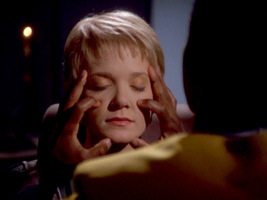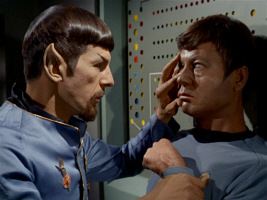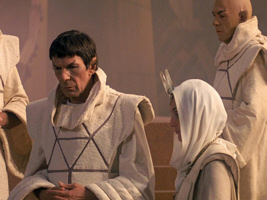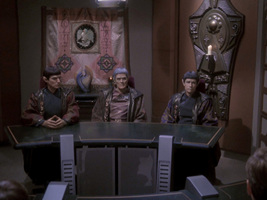Vulcan Mind Melds
Mind Melds in Pre-Enterprise TrekDevelopments in Star Trek EnterpriseConclusion
 Developments in recent shows are not discussed here. I consider the topic closed.
Developments in recent shows are not discussed here. I consider the topic closed.
Mind Melds in Pre-Enterprise Trek
There is overwhelming evidence that mind melds are both commonplace and socially accepted in the 23rd and at latest in the 24th century. When Spock performs the first on-screen mind meld in TOS: "Dagger of the Mind", he explains that it is an "old technique", implying that humans are probably not familiar with it. On the other hand, he doesn't seem to see anything unusual in it. It is the first time Spock carries out a mind meld with a human (namely with van Gelder), but he is confident that it should work. We get the impression that Spock and other Vulcans have performed many mind melds before, among their own kind and also with humans. Only the kind of emotionally motivated "pain relief" mind melds performed by Sybok in "Star Trek: The Final Frontier" may be regarded as immoral. The disregard for Sybok is rather supportive of the fact that other, more "logical" forms of mind melds are accepted among Vulcans, than evidence against it. Otherwise, why should Spock and Sarek be esteemed members of the Vulcan society and Sybok not, if their doings were equally regarded as illegal or immoral?More facts about the history of mind melds are given in TNG: "Unification I". Here, Sarek confesses to Picard that he has never mind-melded with his son Spock. Sarek appears to be sorry about this missed opportunity, now that he is about to die. It may be too late to meet Spock again who is on Romulus at the time. Sarek has previously mind-melded with Kirk in "Star Trek III" and with Picard in TNG: "Sarek".
The ultimate mind meld is the katra ritual when Spock's katra (about equivalent to what we would call mind & soul) is transferred from McCoy's back into his own revived body by the Vulcan high priestess in "Star Trek III". Although this particular ceremony is said to be the absolute exception, Sarek makes it very clear to Kirk in the beginning of the movie that a Vulcan is supposed to transfer his katra to another person prior to the moment of death: "It is the Vulcan way when the body's end is near." Also, in DS9: "The Passenger" Dr. Bashir mentions "synaptic pattern displacement" as a technique to transfer a consciousness to another brain, but he has never heard of a non-Vulcan performing it.In order to stay fair, we may have to distinguish between (directed) mind melds and (random) telepathy, although both phenomena must be closely related. For either of them there is plenty of evidence in Vulcan culture. Spock senses the loss of the USS Intrepid in TOS: "The Immunity Syndrome", a ship manned with Vulcans. It becomes obvious that he wouldn't have noticed the death of a human crew in the same fashion. He uses telepathy (or attempts it) in TOS: "A Taste of Armageddon", "By Any Other Name" and "The Omega Glory". Spock and Saavik communicate telepathically in "Star Trek II". In VOY: "Random Thoughts", Tuvok tells the telepathic Mari security chief that he is used to communicate verbally, and he adds that there are few telepaths in Starfleet. Although it doesn't become clear at first glance, it supports the notion that all Vulcans are telepaths. If Vulcans were generally not telepathic (or just not trained to communicate telepathically), he would have mentioned that as the simple reason for him to prefer using his voice. Finally, in VOY: "Counterpoint" Vulcans are confirmed to be generally telepathic, which would seem like a prerequisite for mind melds.
Spock's father and half-brother are capable of mind-melding like he is himself. If it were just a genetic oddity, the whole family wouldn't necessarily have the same ability, although it might be a plausible assumption. We have to keep in mind that Spock is half human and still has the typical Vulcan characteristics of telepathy and mind-melding. Other Vulcans besides Spock's family who are able and not opposed to perform mind melds include the Vulcan priestess in "Star Trek: The Motion Picture", Tuvok (on several occasions) and the Vulcan Maquis activist Sarkonna in DS9: "The Maquis". Moreover, there is Ensign Vorik, who grabs B'Elanna's head in VOY: "Blood Fever", which Tuvok identifies as an attempt to force a mind meld. We also have Sakkath, who tries to help Sarek contain his emotions in TNG: "Sarek". While it may debatable if they would really mind-meld for that purpose, it is clearly the same kind of outing of emotions. It even seems that this comes close to what Sybok did.Summarizing, mind melds must be common and widely accepted among Vulcans, unless most Vulcans in key roles as officers or even ambassadors were outcasts, which would be a contradiction in itself. Lon Suder, for instance, speaks of mind melds as "that Vulcan thing" in VOY: "Meld", implying that it is typical of Vulcans, while he himself is not fond of the procedure. Janeway mentions in "Unimatrix Zero" that once a Vulcan mind-melded with her, and from the way she says it, it probably wasn't Tuvok. The only real criticism about mind melds (aside from the Devore in VOY: "Counterpoint", who are afraid of any telepaths) comes from Voyager's EMH, who is concerned about the procedure in VOY: "Meld" and speaks of "Vulcan mumbo-jumbo" in VOY: "Infinite Regress", although he has no objections to it in "Ex Post Facto" and "Flashback". "A mind meld with a family member is thought to help bring the memory to the surface", which would help Tuvok in "Flashback". Finally, mind melds with a compatible Vulcan (such as a family member) are known as the only remedy against Tuvok's illness in VOY: "Endgame". The Doctor has obviously examined all other Vulcans aboard (apparently two at the time, although their number was always subject to change) for that purpose.
Developments in Star Trek Enterprise
ENT: Fusion
This episode shows mind melds in a completely new light. Not only is the mind meld shown as an offense, almost like a mental rape. It is obviously even unknown to most Vulcans. Tolaris, a dissenter who doesn't follow the same ways as most of the Vulcans of his time, surprises T'Pol with the idea of a mind meld. Although she is over 60 years old, she unmistakably doesn't know mind melds at all, so Tolaris has to explain what they are about.
This already indicates that Vulcan society must have undergone a significant change until 100 years later, only two Vulcan generations. Such a revolution appears unlikely in a civilization that has existed for millennia and has adopted a strict discipline to avoid war and violence - although their leaders don't seem to be acting according to Surak's teachings. The possibility that mind melds are gaining acceptance slower (meaning within more than 200 years rather than 100 years) does not seem more likely in this respect. What's more, it would mark Sarek's family, including himself and Spock, and also the high priestess, as some sort of rebels in the 23rd century, and they probably couldn't perform mind melds as freely and openly as they always do.ENT: Stigma
The dilemma, however, becomes much worse in ENT: "Stigma". Not only is it a disrespected minority of "melders" that performs mind melds. In fact, it is explicitly stated by the physicians in the episode that only a small percentage of Vulcans is capable of mind melds at all because of what is seen as a genetic defect. The real-world reason for this amendment is that the episode was conceived as an allegory to AIDS. This is why a previously non-existent difference between "gay" and "straight" Vulcans was made up.
The notion that only few Vulcans are "melders" is a clear contradiction to the nature of Vulcans in the 23rd and particularly in the 24th century. On all occasions in the 24th century it is tacitly assumed that all Vulcans are capable of mind-melding. The question whether a particular Vulcan could mind-meld never occurs. Moreover, mind melds are regarded as the *defining* quality of Vulcans, one which distinguishes them from other species who are "only" telepathic. We may explain single incidents. For instance, the EMH's remark in "Endgame" that he could not find a compatible Vulcan to heal Tuvok may well be taken as a sign that he was looking for another of the rare melders (whilst usually only one of the two minds would have to be capable of melding). But the overall frequency and acceptance of mind melds and ultimately Sarek's statement about the katra transfer make the notion that only few Vulcans should be capable of doing that so exceedingly unlikely that it has to be untrue.
The statements from "Stigma" wouldn't exclude that all Vulcans may be telepathic on a lower level than mind melds. But even if Enterprise showed the special ability of the "gay" minority as socially accepted, it could never become a distinguishing mark of Vulcans in general. Thus, the only solution is to disregard the assessment of Vulcan scholars that the ability to meld should be an anomaly. Even if this lets appear them in a still worse light, they may have forged the evidence in a disgusting fashion to stigmatize parts of their population - like Nazi "scientists" who attempted to prove the superiority of the white race. On a side note, the parallel between "melders" and gay people doesn't actually make sense anyway if we consider that being gay is not inherited (at least not that we know of to date), while the alleged "melding anomaly" in Spock's family clearly would be.On a still different note, even the continuity between the two Enterprise episodes "Fusion" and "Stigma" does not really work. In "Fusion", T'Pol evidently did not know that mind melds even existed. In "Stigma", however, the impression was created that every Vulcan was well aware of the Pa'nar syndrome - an infectious illness that is transferred exclusively through the detested mind melds. It may be objected that T'Pol may have informed herself as late as she had already contracted the Pa'nar syndrome herself, and that, of all Vulcans, only physicians are likely to be familiar with the illness. But if this were so, how could it have become what the episode title says, a stigma? The reason for AIDS being stigmatized in our time is that everyone on Earth is familiar with the disease, how it spreads (through sexual intercourse) and among which group it occurred first or most frequently (among gay people). "Stigma" would make no sense if Pa'nar were a secret, whilst "Fusion" would not work if T'Pol were already familiar with the "melders" and their practices. That would be as contradictory as a present-day human saying "What is sex? No idea. But these HIV-positive folks are despicable because of their immoral practices." This is only one more reason why the statements made by the physicians in "Stigma" must not be taken seriously.
ENT: The Forge, Awakening, Kir'Shara
The small Vulcan arc is full of mentions of the nature of mind melds and of the katra. And the very procedures are performed frequently and by different people. In "The Forge" the Enterprise crew ask Soval to get a "melder" to mind-meld with a comatose survivor of the explosion in the embassy. Soval hesitates, but then offers to perform the procedure himself. So is he coincidentally one of the very few "melders"? The author could have anticipated the resolution by letting Soval say something like "Actually all Vulcans can mind-meld. But few would admit." But it was decided that not even Soval should know that the propaganda about few people having this embarrassing defect was wrong. By asking the ambassador in the first place, Phlox, Malcolm and Trip presuppose that mind melds would work with humans too. They may be desperate to find out the truth about the bombing, so they may wittingly demand something that must be considered indecent as well as unlikely. Soval himself says "I doubt if this has ever been attempted with a human before." Of course, if mind melds are not allowed to be performed openly, this statement makes perfect sense.
Side note V'Las and his assistant represent the official stance of the Vulcan society on telepathy and indirectly on mind melds when they deny to acknowledge Soval's observations through the eyes of Phlox's patient: "Telepathic evidence is inadmissible." - "It is not evidence at all!" On the other hand, this regulation, if it is authentic, is not necessarily particularly narrow-minded. Even a society where telepathy is omnipresent has to draw a line somewhere.
The next hint tackling the issue of mind melds comes from T'Pol: "Syrranites claim [the katra] it's the essence of the Vulcan mind, that it can be transferred from the body before death and stored in some manner." Moreover, one of the Syrranites purportedly carries Surak's katra. Finally Arev, the Syrranite who is actually Syrran himself, says about mind melds, "Surak tells us, it is the heritage of every Vulcan, even those who don't believe in the practice." In other words, every Vulcan could do mind melds, the only requirement is to believe in this procedure. Although this sounds much like astrology or homeopathy, more solid evidence will follow in the next installments.
Arev/Syrran transfers his and Surak's katra to Archer before he dies. He does that in a quite similar fashion as Spock did in "Star Trek II". In "Awakening" Archer has visions of Surak who occupies his mind. Among other things Surak says, "The culture you've come to know isn't the one I helped to create." This points at a previous change in the Vulcan society that could help explain why no one would want to meld their minds in the present era. Evidently Arev/Syrran was a "melder". Soval calls himself a "melder" at the High Command, still under the impression it is an unusual treat. In contrast, T'Pau is a melder who freely practices the procedure, as she does with Archer in the attempt to retrieve Surak's katra. She will meld with T'Pol too in "Kir'Shara" as she did already with T'Les. Finally, it is mentioned that one of the scientists who had excavated a vessel with a katra at P'Jem tried to mind-meld with it. This is a lot of evidence telling us that mind melding capabilities are quite common and that the procedure was probably openly performed in Surak's time, along with other aspects of his philosophy that may have been lost.In "Kir'Shara" it is eventually confirmed that every Vulcan may be able to meld. T'Pau says she could initiate the capability of melding in everyone. According to her, the notion that Pa'nar should be incurable is "another lie perpetuated by the High Command." In fact, as she says, the syndrome has already been around at the time of Surak, caused by melders who have been insufficiently trained. These statements obviously specifically address the problem of the alleged "stigma" raised in the episode of the same name. It is the only explanation that the High Command fabricated "scientific evidence" to maintain the old order against better knowledge. While the ultimate scientific proof may be still missing, we are inclined to believe everything that T'Pau said, now knowing how degraded the former leadership of Vulcan was.
Addendum In the Mirror Universe, T'Pol uses a mind meld to control Trip's mind, make him sabotage the power grid and later provide him with false memories (ENT: "In a Mirror, Darkly").
Conclusion
There is absolutely no reason to still believe that only a small percentage of all Vulcans are capable of mind melds. This utter misconception has been ultimately debunked, and the inter-series continuity has been fixed.
The history of mind melds could be recounted like this: Vulcans have always been able to meld their minds. In Surak's time this was a common practice. It just required sufficient training in order to avoid the neural damage known as the Pa'nar syndrome. But in some way this knowledge must have faded from the collective Vulcan memory. Possibly the technically advanced society that had begun to explore the stars some 300 years before the time of Enterprise (ENT: "The Forge") didn't consider mind melds to be beneficial or desirable any longer. Only small groups kept the knowledge about the practice, like the people in ENT: "Fusion" or the Syrranites. Likewise, mental discipline seems to have been usually neglected in this era, although the Vulcans always claimed to be superior to humans in this respect. The High Command and particularly the occasionally volatile V'Las began to pursue an agenda that didn't comply with Surak's teachings (ENT: "The Andorian Incident", "Shadows of P'Jem"). This is why they saw the peaceful and non-conformist Syrranites as a danger. They made up scientific evidence that would stigmatize and segregate the dissenters. In a double strike the ability to meld was said to be an anomaly, and the Pa'nar syndrome was declared an inevitable and incurable side effect of mind melds. After V'Las has been ousted and the Kir'Shara with Surak's original writings has been published, the Vulcan society must have undergone a significant change. The ways of the Syrranites have gained general acceptance. What's more, they seem to have become much like a new doctrine, seeing that the 23rd century Vulcans like Sarek can be characterized as mentally disciplined and willing to meld their minds whenever they consider it healthful or necessary.Virtually no question remains unanswered. The High Command may have launched a subtle campaign to discredit "melders" some time before "Stigma". Knowing that she had been spending most of her time on Earth, T'Pol may not yet have been aware of all this, which explains her carelessness in this episode. We still have to wonder why she had never heard of the very procedure of mind melds either. Even and especially if it was said to be a myth just like katras (T'Pol knew of the latter in "Awakening"), there is hardly a way not to hear of it in the 65 years of her life. On the other hand, maybe she knew of it but left the explanation to Tolaris.
See Also
Vulcan Lies and Errors - So Vulcans never lie?
Credits
Some screen caps from TrekCore. Thank you so much to the creative staff, namely to Judith Reeves-Stevens & Garfield Reeves-Stevens, Andre Bormanis, Mike Sussman and Manny Coto, for listening to the true fans and fixing a gaping continuity error with a fantastic story arc.







 Tuvok mind-melds in VOY: "Cold Fire"
Tuvok mind-melds in VOY: "Cold Fire"














